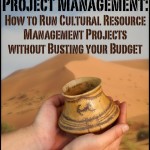 I recently overheard a couple of co-workers arguing about who was going to help the new CRM archaeology principal investigator (PI) with a problem that I encountered earlier in my tenure at this company. The PI didn’t know how he was supposed to formally request information from the lab, which requires a series of convoluted “formal request” emails.
I recently overheard a couple of co-workers arguing about who was going to help the new CRM archaeology principal investigator (PI) with a problem that I encountered earlier in my tenure at this company. The PI didn’t know how he was supposed to formally request information from the lab, which requires a series of convoluted “formal request” emails.
The lab employees regularly refuse to help the cultural resources PIs or project managers process their lab work unless a formal request is made. It’s really bizarre because we can talk to the lab manager over the phone and directly ask them for help and they will flat out refuse unless you fill out the proper form and email it. They say its for their own data management and that they’re soooooo busy that they may forget your request. The new PI wasn’t aware of this protocol and simply asked for the lab’s help.
They didn’t comply and now, weeks later, they made him fill out the forms. Now, they were arguing about who was going to actually fulfill the request (BTW he was asking for the records search information to be formatted for our report, a task that literally takes about an hour to do that the lab will bill out as an entire 8-hr day).
As I listened to them discuss who was going to do “work”, I just couldn’t hold my breath anymore. “Why didn’t you help him out in the first place?” I asked. “Aren’t we all working for the same company?”
They looked at me as if I’d uttered a curse word.
“He’s got to learn how things work here at this company,” the assistant lab manager replied. “It’s sink or swim. That’s how it is around here. He has to learn from his mistakes.”
Wow! Rather than help a co-worker, they’d rather see him fail and treat it like a learning tool. What do you learn from your co-workers sabotaging your project? Plus, this creates an adversarial workplace where employees regularly mete out revenge on each other or set each other up for failure. Instead of helping each other work towards a common goal– documenting cultural resources, making money for the company and better serving our clients– people are caught up in petty feuds based on a general lack of respect.
I can’t say this is the rule everywhere I’ve worked, but this type of workplace does exist. And it’s too bad. I don’t believe this is how it should be, which is one of the reasons I started this blog. I want to help people out because, at crucial points I may career, I got invaluable help from other mature, experienced CRMarch sages.
Don’t get me wrong. I don’t have all the answers and I don’t pretend to. Like the immortal self-help guru Napoleon Hill once said, “I was in demand, not because of what I knew…but because of my willingness to make the best use of what little I did know.”
We historical preservationists, CRM archaeologists, and heritage conservationists can learn volumes from this statement. Cooperation will further our fields more than dissent. Here are five tips I believe will do much to banish the sink or swim phenomena in archaeology and heritage conservation. Some of these come straight our of my book Small Archaeology Project Management. Others are just personal best practices that I like to use whenever possible:
1). Treat co-workers like they’re human beings- Sounds pretty simple, right. Don’t treat your co-workers like they’re simply tools that you are using for your own personal gain. Arch techs are not “grunts.” Supervisors aren’t “control freaks.” Clients aren’t “cheap scumbags.” They’re people, just like you are and they deserve to be treated as such, even if they act selfishly and vindictively.
2). Communicate as well as possible and ask for question- Here’s one that I regularly forget. Clear communication is essential in our field, especially when the going gets tough. I can’t tell you how many mistakes I’ve made because I failed to tell others what I really wanted and/or the supervisors failed to communicate what they want. Speak and write clearly.
Keep your messages short and to the point. My first PI once told me that the best archaeologists can communicate complicated topics to a 9-year-old because that’s about the right amount of archaeological knowledge that the average person has. It’s a great rule to follow.
3). Golden rule is the only rule- This is an outgrowth of Tip #1, but it’s more general. “Do unto others” is the basis of all civilization. It makes for a more productive workplace and many successful outcomes.
4). Freely share what you know- This seems like a no-brainer to me, but many archaeologists don’t seem to feel the same way. The best way to learn more and become a master of your trade is to freely share what little you know. None of us know everything, but we won’t know anything if we’re stingy with the little that we do know. I understand that we can’t share some knowledge because of contracting or the publishing industry, but there’s almost always a way around that.
And, make sure you share first. This makes other feel obligated to share information with you, which furthers the dialogue and increases your knowledge.
5). Ask about what you don’t already know- Don’t pretend like you know everything. Ask others to help you out and share their knowledge. It’s much better to ask your co-workers than it is to continue long a dead end path only to find out that they coulda helped you out all along.
Most importantly– TALK TO NON-ARCHAEOLOGISTS. It’s time we rethink our position as the ombudsmen of knowledge and reach out to the communities I which we work. Like we discussed on this week’s CRM Archaeology Podcast, we archaeologists need to think outside the box and reach out to communities before the government gets rid of our bureaucratic, insular industry. We need friends on the outside. Now is the time to find them.
I hate the sink or swim analogy. We’re not boats or baby birds. We’re people. Our field stands much more to gain by collaboration and openness than the close-minded path we’ve been following for the last 50 years. It’s time for a change. Those five tips will help speed up this change.
I would really love to hear from you. If you have any questions or comments, write below or send me an email.
 Small Archaeology Project Management is now on the Kindle Store. Over 225 copies were sold in the first week! Click Here and see what the buzz is all about
Small Archaeology Project Management is now on the Kindle Store. Over 225 copies were sold in the first week! Click Here and see what the buzz is all about
Learn how my résumé-writing knowledge helped four of my fellow archaeologists land cultural resources jobs in a single week!
Join the Succinct Research email list and receive additional information on the CRM and heritage conservation field.



What you describe does not sound like a workable management strategy for a cultural resources firm (i.e., one that works on jobs for profit and adheres to tight schedules). Rather what it sounds like you are describing is a governmental agency’s approach. I’ve worked in both private and public cultural resources organizations and know that if what was described was happening at a private firm, no matter how knowledgeable or or highly reputable the lab staff were, with kind of attitude, they would be looking for a new job elsewhere. What you describe does however, sound familiar to the attitudes of some governmental laboratory staff that have been encountered and think they are the most important aspect of the research program. The reason being is their jobs usually are protected and safe (job seniority) and they like to tout their inside importance over those who do outside fieldwork. Sometimes in order for change to occur in situations like this, it requires a person willing to take the problem to a higher level within the organization. This step, however, only should be done if you believe reporting the problem will actually result in positive change. Sometimes the Management will side with the Lab staff, and the result is an awkward and unworkable position for yourself that is fixed only by leaving. Good luck is the best I can offer. For me, I am happy to have been able to retire from CRM work and concentrate on the fun things in life!
Thanks for the response. I’ve only worked in CRM and in a university setting and I can say this attitude is pervasive in some companies. At some companies, co-workers horde information or force their peers to jump through hoops just so they can put new-hires through some sort of “trial by fire.” It’s especially bad when PIs or project managers get in on it. There is no such thing as trial by fire. There’s only costly mistakes that diminish productivity and profits.
It’s a difficult situation to fix as the people that are doing this stuff don’t think they’re doing anything wrong. It’s how they were “taught” archaeology, so they think that’s how it should be in the future. Many managers don’t see anything wrong with a little of this, or they don’t want to be involved in any “drama.” I think cultivating an attitude of openness and immediately offering to help others with their projects is the only way to combat this situation. If others see you showing generosity, it will make them look like a fool when they don’t reciprocate.